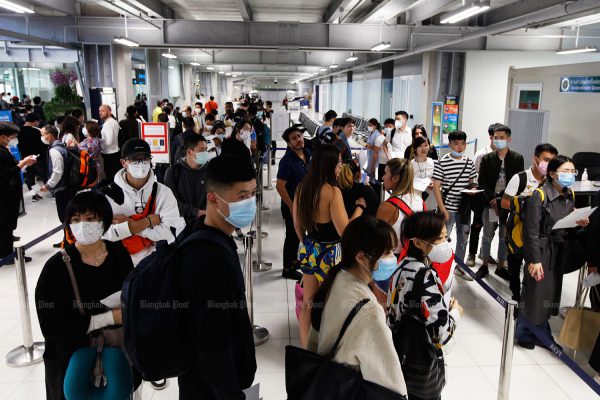BANGKOK, 11 March 2020: Thailand Civil Aviation Authority of Thailand has imposed new rules for airlines flying from cities in the four-high risk countries identified by the Thai government.
Passengers checking in flights from the four countries (China including Hong Kong and Macau, South Korea, Iran and Italy) collectively described as a “Disease Infected Zones” must pass through health checks and present a health certificate to airline staff at the check-in counters.
CAAT outline the new rules for airlines on its website, 9 March.

“To support the surveillance measures adopted by the Ministry of Public Health,” the Civil Aviation Authority of Thailand said it had amended its guideline for airlines.
CAAT noted that passengers from Disease Infected Zones would be “subject to quarantine and any other measures for the prevention and control of communicable diseases as imposed by the Government of Thailand.”
Airlines providing flights to Thailand from airports in the DIZ countries are required to perform screening of passengers at check-in. Passengers need to present health certificates certifying that “they have no risk of the Covid–19. If a passenger is unable to present such certificate, boarding shall be denied, and the boarding pass shall not be issued,” CAAT stated.
The screening of passengers takes place at the airport of departure in the countries identified as high-risk by Thailand’s Ministry of Public Health.
After checking the health certificate and issuing boarding passes to the passengers the airline must distribute “Form T 8 issued under the Communicable Diseases Act B. E. 2558 ( 2015)”.
The form requires passengers to fill out the form and submit them to communicable disease control officials at the airport of disembarkation in Thailand.
The communicable disease control official has the jurisdiction to issue various orders under the Communicable Diseases Act.
They can prevent anyone from entering or leaving the aircraft without undergoing a medical examination.
They can detain an aircraft, move it to a remote parking area and order fumigation.
They are also legally empowered to order passengers and crew to undergo a medical examination and may also isolate, quarantine and confine them for observation.
All expenses incurred relating to isolation, quarantine, confinement for observation, and immunisation of passengers and crew on board, including the expenses for care, hospitalisation as well as procedures for the prevention and control of an international communicable disease will be borne by the airline.






